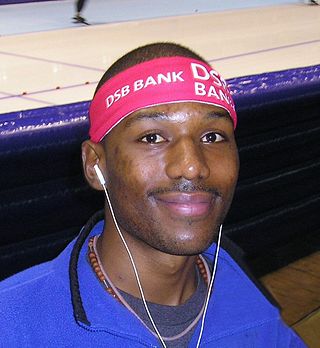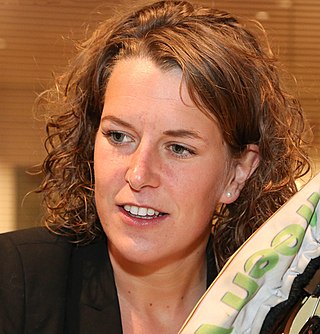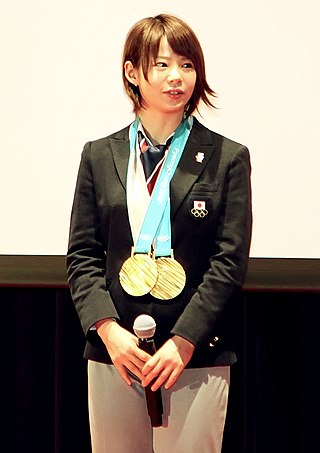Olympic records are the best performances in a specific event in that event's history in either the Summer Olympic Games or the Winter Olympic Games.

Speed skating is a competitive form of ice skating in which the competitors race each other in travelling a certain distance on skates. Types of speed skating are long-track speed skating, short-track speed skating, and marathon speed skating. In the Olympic Games, long-track speed skating is usually referred to as just "speed skating", while short-track speed skating is known as "short track". The International Skating Union (ISU), the governing body of competitive ice sports, refers to long track as "speed skating" and short track as "short track skating". Long track speed skating takes place on a 400m ice track, while short track takes place on a 111m track.

The Winter Olympic Games, also known as the Winter Olympics, is a major international multi-sport event held once every four years for sports practiced on snow and ice. The first Winter Olympic Games, the 1924 Winter Olympics, were held in Chamonix, France. The modern Olympic Games were inspired by the ancient Olympic Games, which were held in Olympia, Greece, from 776 BCE to 394 CE. The Baron Pierre de Coubertin of France founded the International Olympic Committee (IOC) 1,500 years later in 1894, leading to the first modern Summer Olympic Games in Athens, Greece in 1896. The IOC is the governing body of the Olympic Movement, with the Olympic Charter defining its structure and authority. The original five Winter Olympic Sports were bobsleigh, curling, ice hockey, Nordic skiing, and skating. The Games were held every four years from 1924 to 1936, interrupted in 1940 and 1944 by World War II, and resumed in 1948. Until 1992, the Summer Olympic Games and the Winter Olympic Games were held in the same year. A decision to change this was made in 1986, when during the 91st International Olympic Committee session, IOC members decided to alternate the Summer Olympic Games and the Winter Olympic Games on separate four-year cycles in even-numbered years. Also, at that same congress it was decided that 1992 Winter Olympics would be the last to be held in the same year as the Summer Games and that to change the rotation, the games that would be held in 1996 would be brought forward by two years, being scheduled to 1994. After those games, the next were to be held in 1998 when the four-year Olympic Cycle resumed.

Eric Arthur Heiden is an American physician and a former long track speed skater, road cyclist and track cyclist. He won an unprecedented five individual gold medals, and set four Olympic records and one world record at the 1980 Winter Olympic Games. Heiden was the most successful athlete at those Olympic Games, single-handedly winning more gold medals than all nations except for the Soviet Union (10) and East Germany (9). He is the most successful Winter Olympian from a single edition of any Winter Olympics. He delivered the Athlete's Oath at those same 1980 Games. His coach was Dianne Holum.

Short-track speed skating is a form of competitive ice speed skating. In competitions, multiple skaters skate on an oval ice track with a length of 111.111 metres (364.54 ft). The rink itself is 60 metres (196.85 ft) long by 30 metres (98.43 ft) wide, which is the same size as an Olympic-sized figure skating rink and an international-sized ice hockey rink. Related sports include long-track speed skating and inline speed skating.

The 1928 Winter Olympics, officially known as the II Olympic Winter Games and commonly known as St. Moritz 1928, were an international winter multi-sport event that was celebrated from 11 to 19 February 1928 in St. Moritz, Switzerland.

The 1992 Winter Olympics, officially known as the XVI Olympic Winter Games and commonly known as Albertville '92, were a winter multi-sport event held from 8 to 23 February 1992 in and around Albertville, France. Albertville won the bid to host the Winter Olympics in 1986, beating Sofia, Falun, Lillehammer, Cortina d'Ampezzo, Anchorage, and Berchtesgaden. The 1992 Winter Olympics were the last winter games held in the same year as the Summer Olympics. The Games were the fifth Olympic Games held in France and the country's third Winter Olympics, after the 1924 Winter Games in Chamonix and the 1968 Winter Games in Grenoble. This games was the first of two consecutive Olympic games to be held in Western Europe, preceding the 1992 Summer Olympics in Barcelona, Spain.

The Olympic Oval in Calgary, Alberta, Canada, is North America's first covered speed skating oval; it was built for the 1988 Winter Olympics and opened 38 years ago on September 27, 1987. Located on the University of Calgary campus, it is the official designated training centre for Speed Skating Canada and the Elite Athlete Pathway. This oval includes a hockey rink, a short track speed skating rink, a 400m long track rink and a 450 m running track.

Shani Earl Davis is an American former speed skater.

Arnold Clas ("Classe") Robert Thunberg was a Finnish speed skater who won five Olympic gold medals – three at the inaugural Winter Olympics held in Chamonix in 1924 and two at the 1928 Winter Olympics held in St. Moritz. He was the most successful athlete at both of these Winter Olympics, sharing the honour for 1928 Winter Olympics with Johan Grøttumsbraaten of Norway. No other athlete ever won such a high fraction of all Olympic events at a single Games. He was born and died in Helsinki.

Vikingskipet, officially known as Hamar Olympic Hall, is an indoor multi-use sport and event venue in Hamar, Norway. It was built as the speed skating rink for the 1994 Winter Olympics, and has since also hosted events and tournaments in ice speedway, motorcycle speedway, rally, association football, bandy, ice sledge speed racing, flying disc and track cycling. The arena is also used for concerts, trade fair and the annual computer party The Gathering. It is the home arena of Hamar IL bandy team. The venue is owned by Hamar Municipality, and along with Hamar Olympic Amphitheatre is run by the municipal Hamar Olympiske Anlegg. Vikingskipet has a capacity for 10,600 spectators during sporting events and 20,000 during concerts.

Long track speed skating has been featured as a sport in the Winter Olympics since the first winter games in 1924. Women's events were added to the Olympic program for the first time in 1960 Squaw Valley Olympics.

Irene Karlijn "Ireen" Wüst is a Dutch former long track speed skater. Wüst became the most successful speed skating Olympian ever by achieving at least one gold medal in each of five consecutive Winter Olympic appearances. Wüst is the second athlete to win a gold medal at five consecutive Olympics, Summer or Winter, and the first to do so in individual events.

The Utah Olympic Oval is an indoor speed skating oval located 14 miles (23 km) southwest of Salt Lake City, in Kearns, Utah. The Oval was built for the 2002 Winter Olympics and it hosted the long-track speed skating events for the 2002 games, a role it is expected reprise for the 2034 Winter Olympics.
The 500 metres speed skating event was part of the speed skating at the 1956 Winter Olympics program. The competition was held on naturally frozen ice on the Lake Misurina. It was held on Saturday, 28 January 1956, and started at noon and ended at 1:15 PM. Forty-seven speed skaters from 17 nations competed.
The 10,000-metre speed skating event was part of the speed skating at the 1956 Winter Olympics programme. It was the last speed skating contest at this Games. The competition was held on naturally frozen ice on the Lake Misurina. It was held on Tuesday, 31 January 1956, from 10 a.m. to 3:15 p.m. Thirty-two speed skaters from 15 nations competed.

Nana Takagi is a Japanese former speed skater who is a member of the Nidec Sankyo speed skating team.

Miho Takagi is a Japanese speed skater. She has won a total of seven medals at the Olympics, two of them gold.

The Netherlands competed at the 2018 Winter Olympics in Pyeongchang, South Korea, between 9 and 25 February 2018. Speed skater Jan Smeekens was appointed as flag bearer for the opening ceremony, which was attended by King Willem Alexander, Queen Máxima and Prime Minister Mark Rutte, who also observed the sporting events that featured Dutch competitors.